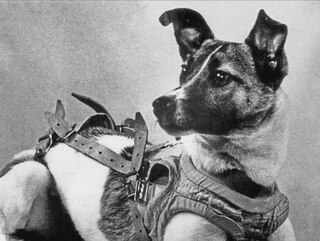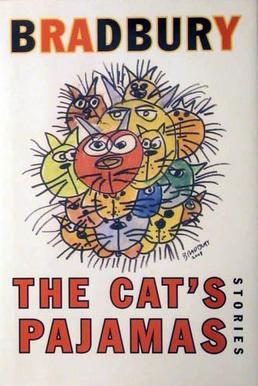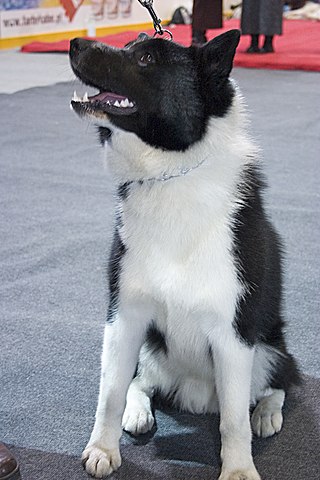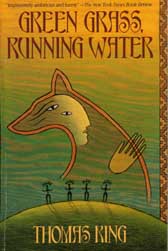
Cosmicomics is a collection of twelve short stories by Italo Calvino first published in Italian in 1965 and in English in 1968. The stories were originally published between 1964 and 1965 in the Italian periodicals Il Caffè and Il Giorno. Each story takes a scientific "fact", and builds an imaginative story around it. An always-extant being called Qfwfq narrates all of the stories save two. Every story is a memory of an event in the history of the universe. Qfwfq also narrates some stories in Calvino's t zero.

Laika was a Soviet space dog who was one of the first animals in space and the first to orbit the Earth. A stray mongrel from the streets of Moscow, she flew aboard the Sputnik 2 spacecraft, launched into low orbit on 3 November 1957. As the technology to de-orbit had not yet been developed, Laika's survival was never expected. She died of overheating hours into the flight, on the craft's fourth orbit.
" '—All You Zombies—' " is a science fiction short story by American writer Robert A. Heinlein. It was written in one day, July 11, 1958, and first published in the March 1959 issue of The Magazine of Fantasy & Science Fiction after being rejected by Playboy.

"The Ugly Little Boy" is a science fiction short story by American writer Isaac Asimov. The story first appeared in the September 1958 issue of Galaxy Science Fiction under the title "Lastborn", and was reprinted under its current title in the 1959 collection Nine Tomorrows. The story deals with a Homo neanderthalensis child which is brought to the future by means of time travel. Robert Silverberg later expanded it into a novel with the same title published in 1992.

Strange Pilgrims is a collection of twelve loosely related short stories by the Nobel Prize–winning Colombian writer Gabriel García Márquez.
"Roog" is a science fiction short story by American writer Philip K. Dick. It was his first sold work, although not his first published story.

Inconstant Moon is a science fiction short story collection by American author Larry Niven that was published in 1973. "Inconstant Moon" is also a 1971 short story that is included in the collection. The title refers to "O, swear not by the moon, th' inconstant moon", a quote from the balcony scene in William Shakespeare's Romeo and Juliet. The collection was assembled from the US collections The Shape of Space and All the Myriad Ways.

The Cat's Pajamas: Stories (2004) is a collection of short stories by Ray Bradbury. The name of its title story comes from a phrase in English meaning a sought after and fancy thing. Another collection by the same name was published in the same year by fellow science fiction author James Morrow.

"From Beyond" is a horror genre short story by American writer H. P. Lovecraft. It was written in 1920 and was first published in The Fantasy Fan in June 1934.

The Fifth Head of Cerberus is the title of both a novella and a single-volume collection of three novellas, written by American science fiction and fantasy author Gene Wolfe, both published in 1972. The novella was included in the anthology Nebula Award Stories Eight.
"Polaris" is a fantasy short story by American author H. P. Lovecraft, written in 1918 and first published in the December 1920 issue of the amateur journal The Philosopher. It is the story that introduces Lovecraft's fictional Pnakotic Manuscripts, the first of his arcane tomes.

"Hypnos" is a short story by American horror fiction writer H. P. Lovecraft, penned in March 1922 and first published in the May 1923 issue of National Amateur.

"He" is a short story by American horror writer H. P. Lovecraft. Written August 1925, it was first published in Weird Tales, September 1926.
"Always" is a science fiction short story by American writer Karen Joy Fowler. Originally published in Asimov's Science Fiction, it won the 2007 Nebula Award for Best Short Story.

Flowers for Algernon is a short story by American author Daniel Keyes, later expanded by him into a novel and subsequently adapted for film and other media. The short story, written in 1958 and first published in the April 1959 issue of The Magazine of Fantasy & Science Fiction, won the Hugo Award for Best Short Story in 1960. The novel was published in 1966 and was joint winner of that year's Nebula Award for Best Novel.

Russo-European Laika is the name of a breed of hunting dog that originated in the forested region of northern Europe and Russia, one of several breeds developed from landrace Laika dogs of Spitz type. The Russo-European Laika itself dates to a breeding program begun in 1944 by E. I. Shereshevsky of the All-Union Research Institute for the Hunting Industry, in Kalinin Province.

Green Grass, Running Water is a 1993 novel by Thomas King, a writer of Cherokee and Greek/German-American descent, and United States and Canadian dual citizenship. He was born and grew up in the United States, and has lived in Canada since 1980. The novel is set in a contemporary First Nations Blackfoot community in Alberta, Canada. It gained attention due to its unique use of structure, narrative, and the fusion of oral and written literary traditions. The novel is rife with humor and satire, particularly regarding Judeo-Christian beliefs as well as Western government and society. Green Grass, Running Water was a finalist for the 1993 Governor General's Award in Fiction.

Dog's Dialogue is a 1977 French is a surrealist short crime film directed by Chilean filmmaker Raúl Ruiz. The film contains popular conventions of the photo-romance but also can be viewed as a parody of the Brazilian telenovela or melodrama and pop culture stereotypes.
"When I Was Miss Dow" is a short story by the American writer Sonya Dorman. It was first published in Galaxy Science Fiction in June 1966. In the story, a being on a planet colonized by people from Earth is reformed as a female human, and has a relationship with a colonist which is more intense that expected.
The Light is a science fiction short story by Poul Anderson. It was first published in Galaxy Science Fiction magazine in March, 1957. The plot concerns the crew of a spaceship from the United States landing on the Moon during a period of intense Cold War tension, and the possibly disastrous consequences of their discovery there.













